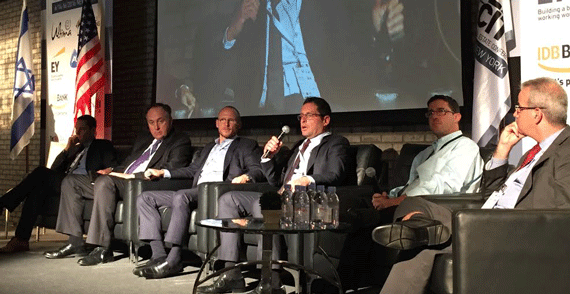If you haven’t heard by now, New York’s developers have discovered Israel as a sort of financing promise-land where they can raise money on the country’s stock exchange at attractive terms. But at the same time, Israeli investors are increasingly crossing the Atlantic, and they’re finding more innovative ways to get into deals in the United States.
“People are going not just to equity. More recently we see a trend of proliferation of product – people going to not just equity but debt deals,” Gal Yadin, director of the restructuring and finance group at the accounting firm EY Israel, told those who gathered at the Dream Downtown hotel Wednesday for the Nadlan in the City real estate conference.
“So these are growing, and to me, this trend of investment in debt, sometimes private debt, is the flip side of what we see on the public debt side in Israel,” he added.
While firms like Extell Development, the Related Companies and KBS Strategic Opportunity REIT have navigated the ins and outs of the Tel Aviv Stock Exchange to raise a combined $1 billion in recent years, Israeli investors are increasingly looking to invest in the U.S.
Thanks to the country’s high-contribution pension system, Israeli pension funds are swelling, and for some years now they’ve been diversifying away from securities into alternative investments.
In 2014, for instance, Alto Real Estate Fund raised a $140 million dedicated U.S. real estate fund backed in large part by Israeli insurers and pension funds. And the insurance firm Menora Mivtachim Holdings last year invested alongside Thor Equities in its $136 million acquisition of the 257,000-square-foot office building at 180 Livingston Street in downtown Brooklyn.
But the country’s investors are also getting into the debt game here in New York. The asset management firm Altshuler Shaham took part of the senior debt position in the $1.4 billion refinancing of the MetLife Building last year, and a senior mezzanine position in the refi of the Standard High Line hotel, Yadin said.
And they’ve got more and more to spend.
“Monetary assets of the Israel public today [are] nearing a trillion dollars. About 40 percent of that is managed by Israeli institutional investors,” Yadin explained. “If you look back to 2005, only 5 percent of that money was invested offshore. In 2010 it was 15 percent and last year it reached 25 percent, which means that in the last five years alone, over $35 billion was invested by Israeli institutions offshore. Now a lot of this money goes into the U.S., and a large chunk of it ends up in real estate.”
